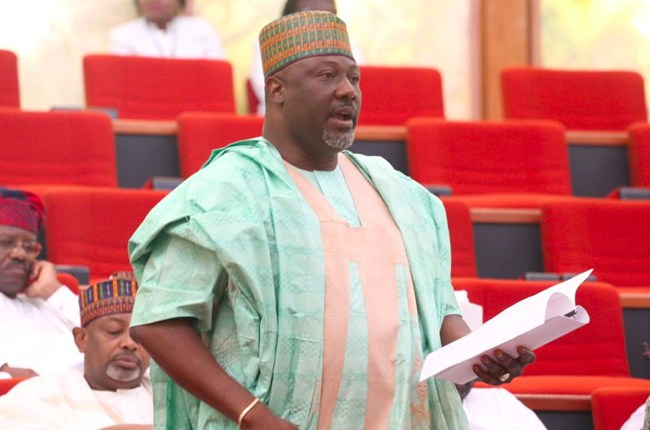Economy
Senate Probes Hidden N14.7bn PHCN Privatisation Proceeds

By Adedapo Adesanya
The Senate Committee on Public Accounts has begun the investigation of N14.7 billion proceeds of privatisation of the defunct Power Holding Company of Nigeria (PHCN) allegedly hidden in commercial banks by the Bureau of Public Enterprise (BPE).
The committee is acting on an audit query in the ‘Auditor-General for the Federation’s Annual Report on Non-Compliance/Internal Control Weaknesses Issues in Ministries, Departments and Agencies of the Federal Government of Nigeria for the Year Ended 31st December 2019.’
The Acting Auditor-General of the Federation, Mr Adolphus Aghughu, had presented the report to the Clerk of the National Assembly, Mr Ojo Amos, on September 15, 2021, while the Senate and House Committees on Public Accounts began an investigation of the queries.
The defunct government-owned National Electric Power Authority (NEPA) was privatised and renamed PHCN, which was later unbundled to become the present generation and distribution companies.
The query stated that the funds from the PHCN privatisation were still in the banks as of December 31, 2016, whereas the privatisation of the PHCN had been concluded since 2013.
The query read in part, “Audit verification and reconciliation revealed that the sum of N14,720,396,432.43, being proceeds from the privatisation exercise of the Power Holding Company of Nigeria was reported in the bureau’s trial balance to be in commercial bank accounts as at31st December 2016.
“Whereas the privatisation of the PHCN was concluded in 2013, the proceeds are yet to be remitted to the Central Bank of Nigeria Privatisation Proceeds Accounts.
“The issue has been communicated to the bureau via a letter with reference no. OAuGF/RESAD/05/2016/07, dated 19th April, 2018, and no response has been received.
“Unauthorised funds kept in commercial banks may be diverted for other purposes, thereby leading to loss of revenue available for government programmes.
“The Director-General (of the BPE) is required to recover the sum of N14,720,396,432.43, being proceeds of the PHCN, and remit same to CRF and forward evidence of remittance to my office for audit confirmation.”
The BPE, in its written submission, however, stated that two separate sums of N3,231,984.73 allegedly held in Fidelity Bank Plc and N18,199,520.87 held in Stanbic Bank were “unaudited bank balances that were actually no longer in existence as of the date of the audited financial statements or asked questions, the matter would have been clarified.”
The bureau added, “With respect to the two other bank balances – N4.4bn (Access Bank Plc) and N10.2bn in FCMB, the correct balance in Access Bank as at 31/12/16 was NIL as the bank had transferred a swelled balance of $34.1m to the CBN Domiciliary Account.
“The bank had initially been unable to make the transfer as at September 2015 as required under the TSA policy, owing to the inexistence of designated USD Treasury Single Account for dollar balances
“The balance in the FCMB as of 31/12/2016 was only $36,053.55, following a transfer of $65,088,198.53.
“The residual balance remained until 18/95/17 due to inability of the bank to remit as required under the TSA policy, owing to initial unavailability of designated TSA for USD balances as required under the then newly introduced policy.”
The probe is expected to reveal whether the BPE’s claims are true or not.
Economy
Champion Breweries Concludes Bullet Brand Portfolio Acquisition

By Aduragbemi Omiyale
The acquisition of the Bullet brand portfolio from Sun Mark has been completed by Champion Breweries Plc, a statement from the company confirms.
This marks a transformative milestone in the organisation’s strategic expansion into a diversified, pan-African beverage platform.
With this development, Champion Breweries now owns the Bullet brand assets, trademarks, formulations, and commercial rights globally through an asset carve-out structure.
The assets are held in a newly incorporated entity in the Netherlands, in which Champion Breweries holds a majority interest, while Vinar N.V., the majority shareholder of Sun Mark, retains a minority stake.
Bullet products are currently distributed in 14 African markets, positioning Champion Breweries to scale beyond Nigeria in the high-growth ready-to-drink (RTD) alcoholic and energy drink segments.
This expansion significantly broadens the brewer’s addressable market and strengthens its revenue base with an established, profitable portfolio that already enjoys strong brand recognition and consumer loyalty across multiple markets.
“The successful completion of our public equity raises, together with the formal close of the Bullet acquisition, marks a defining moment for Champion Breweries.
“The support we received from both existing shareholders and new investors reflects strong confidence in our long-term strategy to build a diversified, high-growth beverage platform with pan-African scale.
“Our focus now is on disciplined execution, integration, and delivering sustained value across markets,” the chairman of Champion Breweries, Mr Imo-Abasi Jacob, stated.
Through this transaction, Champion Breweries is expected to achieve enhanced foreign exchange earnings, expanded distribution leverage across African markets, integrated supply chain efficiencies, portfolio diversification into high‑growth consumer beverage categories, and strengthened presence in the RTD and energy drink segments.
The acquisition accelerates Champion Breweries’ transition from a regional brewing business to a multi-category consumer platform with continental reach.
Bullet Black is Nigeria’s leading ready-to-drink alcoholic beverage, while Bullet Blue has built a strong presence in the energy drink category across several African markets.
Economy
M-KOPA Nigeria Plans Expansion to Edo, Others After N231bn Credit Milestone

By Adedapo Adesanya
Emerging market fintech firm, M-KOPA, has announced plans to deepen its reach in Nigeria to the South South and South East regions, starting with Edo this year, after providing N231 billion in credit to over 1 million customers in the country.
The firm released its first Nigeria-focused Impact Report, which showed that Nigeria is M-KOPA’s fastest-growing market and fastest to reach the milestone.
Since its foray into the Nigerian market in 2019, M-KOPA has been working to dismantle barriers to financial inclusion by providing flexible smartphone financing and digital financial tools that align with how people in the informal economy earn and manage their money.
It operates in six states in the country, including Lagos, Ogun, and Oyo, among others.
The report highlights the company’s contribution to income generation, digital inclusion and economic opportunity for Every Day Earners across the country.
The report showed that M-KOPA has enabled 290,000 first-time smartphone users, while 56 per cent of agents accessed their first income opportunity through the platform.
It showed high income and livelihood gains among its users, with about 77 per cent of customers leveraging smartphones or digital loans obtained through the platform to generate income, indicating that access to financed devices is directly supporting micro-entrepreneurial activity and informal sector productivity.
Furthermore, 75 per cent of users report higher earnings since gaining access to M-KOPA’s services, suggesting measurable improvements in personal revenue streams. On the distribution side, 99 per cent of agents disclose increased earnings, reflecting positive spillover effects across the company’s value chain.
In addition, 81 per cent of long-term customers state that their household expenses have improved, pointing to enhanced financial stability and better consumption smoothing over time.
Speaking on the report, Mr Babajide Duroshola, General Manager, M-KOPA Nigeria, said, “Nigeria represents extraordinary potential, and we’re proud that it has become M-KOPA’s fastest-growing market. Our Impact Report shows that when Every Day Earners gain access to the right digital and financial tools, they use them to create stability and long-term progress for their families. This is about access that unlocks opportunity and sustained prosperity.”
On its expansion plans Nigeria-wide, the M-KOPA helmsman said, “Many of the states we are considering are already similar to the ones we are currently in proximity… So, there is proximity and similarity between these states, and that’s what we are going to do, starting with Edo.”
He noted that as M-KOPA Nigeria continues to expand, the focus remains on ensuring more everyday earners gain access to the digital and financial tools they need to build resilient, prosperous futures in Nigeria’s rapidly digitising economy.
Economy
Tinubu Okays Extension of Ban on Raw Shea Nut Export by One Year

By Aduragbemi Omiyale
The ban on the export of raw shea nuts from Nigeria has been extended by one year by President Bola Tinubu.
A statement from the Special Adviser to the President on Information and Strategy, Mr Bayo Onanuga, on Wednesday disclosed that the ban is now till February 25, 2027.
It was emphasised that this decision underscores the administration’s commitment to advancing industrial development, strengthening domestic value addition, and supporting the objectives of the Renewed Hope Agenda.
The ban aims to deepen processing capacity within Nigeria, enhance livelihoods in shea-producing communities, and promote the growth of Nigerian exports anchored on value-added products, the statement noted.
To further these objectives, President Tinubu has authorised the two Ministers of the Federal Ministry of Industry, Trade and Investment, and the Presidential Food Security Coordination Unit (PFSCU), to coordinate the implementation of a unified, evidence-based national framework that aligns industrialisation, trade, and investment priorities across the shea nut value chain.
He also approved the adoption of an export framework established by the Nigerian Commodity Exchange (NCX) and the withdrawal of all waivers allowing the direct export of raw shea nuts.
The President directed that any excess supply of raw shea nuts should be exported exclusively through the NCX framework, in accordance with the approved guidelines.
Additionally, he directed the Federal Ministry of Finance to provide access to a dedicated NESS Support Window to enable the Federal Ministry of Industry, Trade and Investment to pilot a Livelihood Finance Mechanism to strengthen production and processing capacity.
Shea nuts, the oil-rich fruits from the shea tree common in the Savanna belt of Nigeria, are the raw material for shea butter, renowned for its moisturising, anti-inflammatory, and antioxidant properties. The extracted butter is a principal ingredient in cosmetics for skin and hair, as well as in edible cooking oil. The Federal Government encourages processing shea nuts into butter locally, as butter fetches between 10 and 20 times the price of the raw nuts.
The federal government said it remains committed to policies that promote inclusive growth, local manufacturing and position Nigeria as a competitive participant in global agricultural value chains.
-

 Feature/OPED6 years ago
Feature/OPED6 years agoDavos was Different this year
-
Travel/Tourism10 years ago
Lagos Seals Western Lodge Hotel In Ikorodu
-

 Showbiz3 years ago
Showbiz3 years agoEstranged Lover Releases Videos of Empress Njamah Bathing
-

 Banking8 years ago
Banking8 years agoSort Codes of GTBank Branches in Nigeria
-

 Economy3 years ago
Economy3 years agoSubsidy Removal: CNG at N130 Per Litre Cheaper Than Petrol—IPMAN
-

 Banking3 years ago
Banking3 years agoSort Codes of UBA Branches in Nigeria
-

 Banking3 years ago
Banking3 years agoFirst Bank Announces Planned Downtime
-

 Sports3 years ago
Sports3 years agoHighest Paid Nigerian Footballer – How Much Do Nigerian Footballers Earn
















